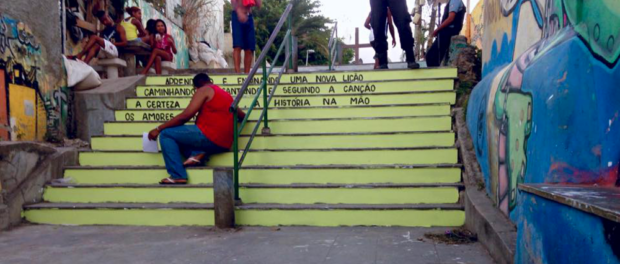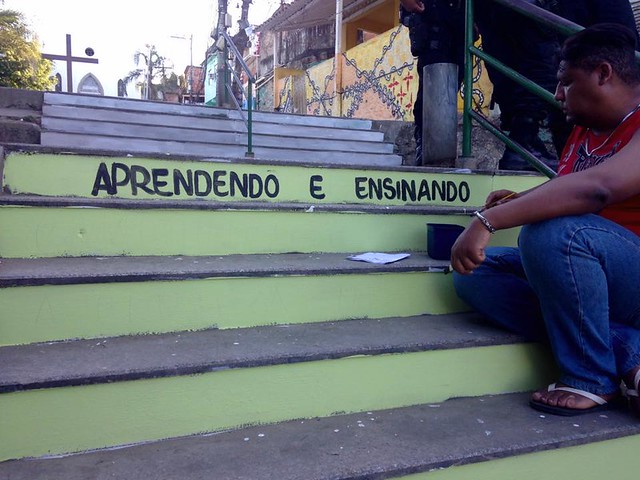
On Saturday August 15, members of the community project Providência Sustentável (Sustainable Providência) organized an event to repaint the historic central staircase in Morro da Providência, Brazil’s first favela. Starting early afternoon, a group of over twenty participants worked until sunset to clean and repaint the stairs in efforts to raise public awareness about the structural and environmental problems in the community.
With colorful paint and the help of Favela Painting, young residents wrote song lyrics on the staircase to publicize their requests for necessary improvements in basic sanitation and waste collection. Continuing until early evening, the project was observed by many residents who passed up and down the stairs, in addition to the presence of Pacifying Police Unit (UPP) officers who stood armed at both the top and bottom of the staircase.
Located in the Port Region, the historic community of Providência has faced forced evictions in recent years due to the city’s multiple development projects in the area, including the Olympic City Porto Maravilha project. The creation of a cable car that connects Providência to the Central Station is just one of the many projects that has been a source of controversy. While the city’s efforts are focused on big, flashy developments in and around Providência, important aspects of the community’s infrastructure remain unaddressed.

Entitled “Staircase in Verses and Colors,” Saturday’s project used art as a means of calling attention to some of the infrastructural neglect experienced by the community. The vision for this artistic transformation was developed by Aline Mendes, resident and founder of the community-based project Providência Sustentável. With a focus on environmental education, Providência Sustentável works to engage the community in activities related to sustainability and environmental awareness.
“[The hope is that] the community will be heard and have its needs for infrastructure, service benefits, sewage leaks, and trash answered…all in a more appropriate way,” said Aline, speaking about the motivation for the project.
Located in the upper part of the community near the former Praça Américo Brum and the cable car station, the staircase receives a lot of foot traffic and was the perfect canvas for delivering the community’s messages. “This principal staircase has a lot of visibility for everyone… for residents and for all the people visiting the favela,” said Aline.
In addition to the strategic location, the selection of the song lyrics was critical for the effectiveness of the project. Phrases were selected from songs by Cazuza, Ultraje a Rigor, Raul Seixas e Geraldo Vandré that all relate to the issues experienced by the community, for example, lyrics taken from the song “Pra Dizer Que Não Falei das Flores” (“To Say That I Didn’t Speak of Flowers”) by Geraldo Vandré: “In schools, on the streets/Fields, buildings/We are all soldiers/Armed or not.”
“[The lyrics] speak about the moment we are living here,” said Aline. She went on to explain that she wanted “phrases with political messages” that would represent the community’s demands.
Using art as a tool to link social, political, and environmental issues, Providência Sustentável’s project provided this central staircase with an additional purpose. This collaborative effort to transform a shared space will be a visual representation of the voices of the community. For both residents and visitors, the steps will hopefully call attention to and further validate the sentiments of the community of Providência.



